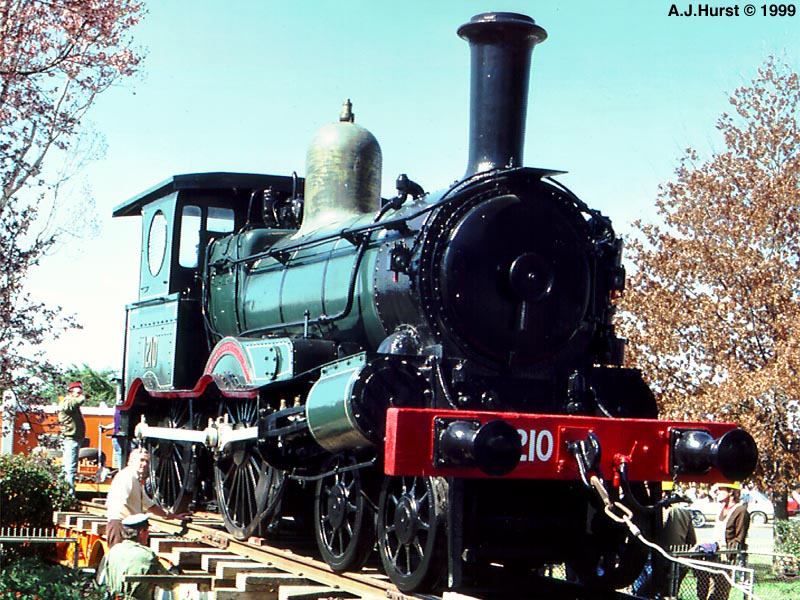|
|
1210 Canberra Railway Museum |
|

1210 and 2705 double-heading a photographers' special
freight train at the NSWRTM Festival of Steam, 6 March 2004.
|
Builder |
Beyer
Peacock & Co, Manchester |
|
|
Builder’s Number & Year |
1767 of 1878 |
|
|
Wheel Arrangement |
4-4-0 |
|
|
No. in class |
68 |
|
|
The handsome
C(79) class 4-4-0 passenger locomotives were introduced in 1877, having been
developed by Beyer Peacock & Co from a similar design supplied earlier to
the NSW Government Railways, the G(23) / (Z)14 class 2-4-0 locomotives of
1865 vintage. The most obvious improvement of the C(79) design was the
addition of a 4-wheel Bissel Bogie at the front of the locomotive. The C(79)
type proved successful with further deliveries swelling to class to 68
examples, including 26 supplied by Dubs & Co, Glasgow and 8 supplied by
local company Atlas Engineering Co at Haymarket, Sydney. The C(79)
class inevitably cascaded to secondary duties and country depots following
the introduction of more modern locomotives, notably the larger 4-6-0
locomotive types. 20 were converted to 4-4-2T configuration between 1895 and
1902 for suburban work, including class leader C 79 which survives to this
day in the guise of 1301. In time the
C(79)’s were modernised with Belpaire boilers and the distinctive Thow
‘porthole’ cabsides. They were reclassified to (Z)12 in the 1924 renumbering
scheme, with the ‘Z’ indicating the type was already considered obsolete. It
is interesting to note that the earlier G(23) / (Z)14 class 2-4-0’s were
rebuilt as 4-4-0’s to resemble the (Z)12 class; indeed it often takes some
inspection to differentiate photos of the two types following rebuilding. While many
(Z)12 locos were withdrawn in the 1930’s following the arrival of the (C)30T
class, a number lingered into the 1950’s and 1960s and indeed the class were
favoured by the NSWGR for country / light lines work over the inside cylinder
4-4-0 types, none of which survived in NSWGR service post 1933. The remaining
(Z)12 class members found niche uses in country operations where passenger
traffic exceeded the capacity of a rail motor, but did not warrant a larger
locomotive. According
to ‘Steam Locomotive Data’ (the official source for NSWGR steam locomotive
service records), 1210 entered service as C 120 in September 1878. It was
renumbered to 1210 of the (Z)12 class in 1924. Photos taken in the 1947
period show it paired with a Baldwin bogie tender. 1210 participated in some
historical / vintage train operations towards the end of its service life
(wearing lined green livery and paired with the original type of tender)
before being withdrawn in January 1962 and condemned on 27 January 1962 with
1,941,551 km travelled. In 1913 loco C 120 / 1210 had the distinction of
working the first train into Canberra and fortunately it was saved for
posterity in recognition of this, being plinthed at Canberra Station in 1962.
Here it was immaculately maintained in its attractive lined green livery with
polished brass dome and other highlights by volunteers from the Australian
Railway Historical Society (ACT Division). In 1984
locomotive 1210 was retrieved for overhaul by the nearby Canberra Railway
Museum, supported by funding from the Australian Bicentennial Authority.
Restoration by volunteers from the ARHS (ACT division) was completed in 1988
in time for the locomotive to participate in the memorable ‘AusSteam88’ event
in Melbourne and other bicentennial celebrations. (The webmaster has fond
memories of visiting the restoration site in Canberra and, later, chasing
1210 on various excursion around this period; happy days.) 1210 has since
been based at the Canberra
Railway Museum and was generally available for tourist and enthusiast
trains, excepting periods of maintenance. Being a light locomotive with
limited tractive effort, it was often rostered with another steam locomotive
on a double-header. Ron Preston provides wonderful accounts and great
photographs of (Z)12-class operations on the NSWGR’s pioneer lines in his
work ‘Tender Into Tank’, together with the (Z)13 class tank converts and some
information on the earlier G(23) / (Z)14 class. Further
information and technical details for the C(79) / (Z)12-class locomotives can
also be found on Wikipedia. Update: 1210 was
withdrawn for overhaul in 2014. I understand it is currently a static exhibit
at the Canberra Railway Museum. |
|||

My thanks to John
Hurst for this view of 1210 being removed from her plinth at Canberra
Station in September 1984.
1210 was subsequently overhauled and returned to main line
operation by volunteers at the Canberra Railway Museum.

Detail view of the ornate Beyer Peacock & Co builder’s
plate on the driving wheel splasher. 8 August 2012

This plaque attached to the cabside records the support of
the Australian Bicentennial Authority. 8
August 2012
References
|
a |
‘Locomotives of Australia’ by Leon Oberg, published by J. W. Books Pty Ltd, 1982 reprint |
|
b |
‘A
Compendium of New South Wales Steam Locomotives’ compiled
by Alex Grunbach, published
by the Australian Railway Historical Society, New South Wales
Division, 1989. |
|
c |
‘Steam
Locomotive Data’ July 1974 edition, compiled
by J. H. Forsyth for the Public
Transport Commission of NSW. |
|
d |
Wikipedia
entry for the NSWGR (Z)12 class, retrieved
17 August 2015. |
Page updated: 13 September 2018
|
Government Railways: |
|
|||||||||
|
Private & Industrial Railways: |
|